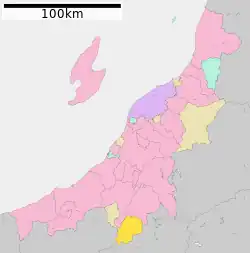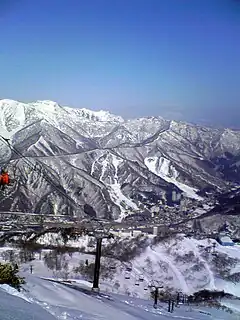Yuzawa, Niigata
Yuzawa (湯沢町, Yuzawa-machi) is a town located in Niigata Prefecture, Japan. As of 1 July 2019, the town had an estimated population of 7,926, and a population density of 22.2 persons per km2. The total area of the town was 357.29 square kilometres (137.95 sq mi). The town is famous for its hot springs.
Yuzawa
湯沢町 | |
|---|---|
 Yuzawa town hall | |
.svg.png.webp) Flag  Emblem | |
 Location of Yuzawa in Niigata | |
 Yuzawa | |
| Coordinates: 36°56′2.4″N 138°49′2.8″E | |
| Country | Japan |
| Region | Chūbu (Kōshin'etsu) (Hokuriku) |
| Prefecture | Niigata |
| District | Minamiuonuma |
| Area | |
| • Total | 357.29 km2 (137.95 sq mi) |
| Population (1 July 2019) | |
| • Total | 7,926 |
| • Density | 22/km2 (57/sq mi) |
| Time zone | UTC+9 (Japan Standard Time) |
| Phone number | 025-784-3451 |
| Address | 300 Kandatsu, Yuzawa-machi, Minami-Uonuma-gun, Niigata-ken 949-6192 |
| Climate | Cfa |
| Website | Official website |
| Symbols | |
| Flower | Cosmos |
| Tree | Prunus sargentii |
Geography
Yuzawa is located in southwestern Niigata Prefecture, in a mountainous area bordering northern Nagano Prefecture and northern Gunma Prefecture. Due to its geographical location between the Sea of Japan and the surrounding Japanese Alps it has one of the highest annual snowfalls in Japan. There are numerous ski resorts within the region. Mount Naeba (2143 meters) is partly located within the town limits. Much of the town is within the borders of either the Jōshin'etsu-kōgen National Park or the Uonuma Renpo Prefectural Park.
Surrounding municipalities
Climate
Yuzawa has a Humid continental climate (Köppen Dfa) characterized by warm, wet summers and cold winters with heavy snowfall. The average annual temperature in Yuzawa is 11.7 °C (53.1 °F). The average annual rainfall is 2,301.9 mm (90.63 in) with September as the wettest month. The temperatures are highest on average in August, at around 24.7 °C (76.5 °F), and lowest in January, at around −0.4 °C (31.3 °F).[1]
| Climate data for Yuzawa (1991−2020 normals, extremes 1978−present) | |||||||||||||
|---|---|---|---|---|---|---|---|---|---|---|---|---|---|
| Month | Jan | Feb | Mar | Apr | May | Jun | Jul | Aug | Sep | Oct | Nov | Dec | Year |
| Record high °C (°F) | 15.5 (59.9) |
17.8 (64.0) |
22.8 (73.0) |
28.5 (83.3) |
34.1 (93.4) |
33.7 (92.7) |
36.6 (97.9) |
37.2 (99.0) |
34.7 (94.5) |
31.0 (87.8) |
25.3 (77.5) |
21.5 (70.7) |
37.2 (99.0) |
| Average high °C (°F) | 2.8 (37.0) |
3.6 (38.5) |
7.7 (45.9) |
15.3 (59.5) |
21.9 (71.4) |
25.0 (77.0) |
28.5 (83.3) |
29.9 (85.8) |
25.4 (77.7) |
19.1 (66.4) |
12.8 (55.0) |
6.1 (43.0) |
16.5 (61.7) |
| Daily mean °C (°F) | −0.4 (31.3) |
−0.1 (31.8) |
3.0 (37.4) |
9.2 (48.6) |
15.7 (60.3) |
19.9 (67.8) |
23.5 (74.3) |
24.7 (76.5) |
20.5 (68.9) |
14.3 (57.7) |
7.9 (46.2) |
2.3 (36.1) |
11.7 (53.1) |
| Average low °C (°F) | −3.2 (26.2) |
−3.4 (25.9) |
−0.9 (30.4) |
3.9 (39.0) |
10.1 (50.2) |
15.4 (59.7) |
19.7 (67.5) |
20.6 (69.1) |
16.6 (61.9) |
10.3 (50.5) |
3.9 (39.0) |
−0.7 (30.7) |
7.7 (45.8) |
| Record low °C (°F) | −12.6 (9.3) |
−11.5 (11.3) |
−10.6 (12.9) |
−5.6 (21.9) |
0.7 (33.3) |
6.2 (43.2) |
11.6 (52.9) |
13.1 (55.6) |
6.2 (43.2) |
0.1 (32.2) |
−6.6 (20.1) |
−9.8 (14.4) |
−12.6 (9.3) |
| Average precipitation mm (inches) | 314.9 (12.40) |
213.3 (8.40) |
165.4 (6.51) |
109.6 (4.31) |
99.7 (3.93) |
135.3 (5.33) |
214.3 (8.44) |
204.5 (8.05) |
175.5 (6.91) |
177.7 (7.00) |
194.7 (7.67) |
309.3 (12.18) |
2,301.9 (90.63) |
| Average snowfall cm (inches) | 377 (148) |
288 (113) |
159 (63) |
20 (7.9) |
0 (0) |
0 (0) |
0 (0) |
0 (0) |
0 (0) |
0 (0) |
12 (4.7) |
210 (83) |
1,054 (415) |
| Average precipitation days (≥ 1.0 mm) | 24.0 | 20.0 | 20.0 | 13.5 | 11.9 | 13.4 | 15.7 | 13.9 | 14.4 | 14.9 | 17.3 | 21.9 | 200.9 |
| Average snowy days (≥ 3 cm) | 20.8 | 17.1 | 14.4 | 2.5 | 0 | 0 | 0 | 0 | 0 | 0 | 1.1 | 11.0 | 66.9 |
| Mean monthly sunshine hours | 45.8 | 62.3 | 95.2 | 149.0 | 189.4 | 140.1 | 129.1 | 164.1 | 111.7 | 107.6 | 88.9 | 63.5 | 1,346.7 |
| Source: Japan Meteorological Agency[2][1] | |||||||||||||
Demographics
Per Japanese census data,[3] the population of Yuzawa has declined over the past 30 years.
| Year | Pop. | ±% |
|---|---|---|
| 1970 | 8,374 | — |
| 1980 | 9,514 | +13.6% |
| 1990 | 9,986 | +5.0% |
| 2000 | 9,130 | −8.6% |
| 2010 | 8,396 | −8.0% |
| 2020 | 7,767 | −7.5% |
History
The area of present-day Yuzawa was part of ancient Echigo Province. The villages of Yuzawa, Futai (二居村, Futai-mura), Asakai (浅貝村, Asakai-mura), Kandatsu (神立村, Kandatsu-mura), Tsuchidaru (土樽村, Tsuchidaru-mura), and Mitsumata (三俣村, Mitsumata-mura) were created on 1 April 1889 as part of the modern municipalities system. On 1 November 1901, Futai and Asakai merged to become the village of Mikuni (三国村, Mikuni-mura). Yuzawa, Mikuni, Kandatsu, Tsuchidaru, and Mitsumata merged on 1 April 1955 to become the town of Yuzawa.
Education
Yuzawa has one public elementary school and one public middle school operated by the town government. The town no longer has a high school.
Transportation
Railway
- Tsuchitaru - Echigo-Nakazato - Echigo-Yuzawa - Iwappara-Ski-jō-mae
![]() Hokuhoku Express - Hokuhoku Line
Hokuhoku Express - Hokuhoku Line
- Echigo-Yuzawa
Local attractions

Ski resorts
There are a large number of ski resorts in the area. The town is served by the Echigo-Yuzawa and Gala-Yuzawa stations on the Jōetsu Shinkansen line, making it one of the most easily accessible winter sports areas from Tokyo, and the town's economy is reliant principally on skiing and snowboarding.
Cultural references
Yasunari Kawabata's classic novel Snow Country takes place in Yuzawa.[4]
See also
- Takahan Ryokan – an historic inn located in Yuzawa
References
- 気象庁 / 平年値(年・月ごとの値). JMA. Retrieved 24 March 2022.
- 観測史上1~10位の値(年間を通じての値). JMA. Retrieved 24 March 2022.
- Yuzawa population statistics
- Lindelauf, Perrin, "Finding the fabled Snow Country", Japan Times, 18 January 2009, p. 12.
External links
 Media related to Yuzawa, Niigata at Wikimedia Commons
Media related to Yuzawa, Niigata at Wikimedia Commons Yuzawa_(Niigata) travel guide from Wikivoyage
Yuzawa_(Niigata) travel guide from Wikivoyage- Official Website (in Japanese)